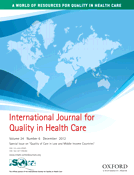
INTERNATIONAL JOURNAL FOR QUALITY IN HEALTH CARE
Scope & Guideline
Transforming public health with cutting-edge insights.
Introduction
Aims and Scopes
- Healthcare Quality Improvement:
The journal emphasizes the development and evaluation of methods aimed at improving the quality of healthcare delivery. This includes studies on quality indicators, patient safety measures, and frameworks for enhancing care practices. - Patient Safety and Risk Management:
A core focus area is the identification, analysis, and mitigation of risks associated with patient care. Research often explores adverse events, safety climates, and the implementation of safety protocols in various healthcare settings. - Patient-Centered Care and Experience:
The journal promotes research on person-centered approaches, emphasizing the importance of patient experiences, preferences, and involvement in care decisions. Studies often assess the impact of patient feedback on service delivery. - Healthcare Policy and Management:
It addresses the implications of healthcare policies on quality and safety, exploring accreditation processes, regulatory frameworks, and leadership strategies that influence healthcare outcomes. - Interdisciplinary Collaboration and Co-production:
The journal highlights the significance of collaborative practices in healthcare, advocating for co-production models that integrate insights from patients, healthcare professionals, and researchers to enhance service delivery.
Trending and Emerging
- Integration of Technology in Quality Improvement:
There is an increasing trend towards research that explores the role of technology, including artificial intelligence and telemedicine, in improving healthcare quality and patient safety. This reflects a shift towards innovative solutions in the post-pandemic landscape. - Mental Health and Well-being:
Recent publications indicate a growing emphasis on mental health, particularly in the context of patient safety and healthcare worker well-being. This theme addresses the complex interplay between mental health services and quality care. - Health Equity and Access:
Emerging research focuses on health equity, addressing disparities in healthcare access and outcomes among diverse populations. This trend signifies a commitment to understanding and improving healthcare for underserved communities. - Patient Engagement and Co-production:
There is a notable increase in studies that emphasize co-production and patient engagement in healthcare processes. This trend highlights the importance of involving patients in decision-making and quality improvement initiatives. - Adaptation to Public Health Crises:
The journal is increasingly publishing research that examines the healthcare system's response to public health emergencies, such as the COVID-19 pandemic. This includes studies on crisis management, resilience, and the adaptation of quality measures in times of crisis.
Declining or Waning
- Traditional Quality Assurance Methods:
There has been a noticeable decline in articles focusing solely on traditional quality assurance methods without integrating innovative or technology-driven approaches. The shift towards more dynamic, real-time quality improvement strategies has diminished interest in static quality measures. - Generalized Healthcare Delivery Models:
Research that presents generalized models of healthcare delivery without specific contextual adaptations has seen reduced prominence. There's a growing preference for tailored approaches that consider local healthcare dynamics and patient populations. - Focus on Isolated Quality Metrics:
The journal has moved away from articles that analyze isolated quality metrics in favor of comprehensive studies that assess quality through multi-faceted frameworks, reflecting a broader understanding of healthcare performance.
Similar Journals
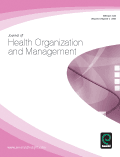
Journal of Health Organization and Management
Empowering professionals with cutting-edge research in health management.The Journal of Health Organization and Management, published by Emerald Group Publishing Ltd, serves as a pivotal resource for professionals, researchers, and students interested in the intersection of health policy and organizational effectiveness. With an ISSN of 1477-7266 and an E-ISSN of 1758-7247, this esteemed journal has been charting advancements in health management since 2003, showcasing articles that reflect rigorous research and the latest trends in the field. Hailing from the United Kingdom, the journal has established itself within the upper echelons of academic literature, currently enjoying a Q2 classification in notable categories, including Business, Management, and Accounting, Health Policy, and Organizational Behavior and Human Resource Management, as of 2023. With impressive rankings in Scopus, including a percentile rank in the 62nd for Business and Management, it is an essential platform for disseminating innovative ideas and evidence-based findings crucial for enhancing health care systems globally. While it operates under a conventional access model, the journal remains dedicated to fostering scholarly dialogue and advancing the understanding of health organization complexities.

Health Information Management Journal
Empowering Leaders in Health Information ManagementHealth Information Management Journal, published by SAGE Publications Inc., is a premier academic resource dedicated to the intersection of health informatics, health information management, health policy, and leadership in health services. With an impressive track record since its inception in 2002, this journal steadily contributes to scholarly dialogue and innovation in the field, holding a commendable Q2 ranking in Health Informatics, Health Information Management, and Health Policy, and a distinguished Q1 ranking in Leadership and Management as of 2023. As a critical platform for researchers, professionals, and students, it fosters the dissemination of cutting-edge research and practical applications, bridging the gap between theory and practice. Though not an open-access journal, it provides a wealth of subscription-based resources that are invaluable for advancing knowledge and improving health systems globally. The journal’s commitment to high-quality, peer-reviewed content ensures that it remains a vital tool for anyone invested in the future of health information management.
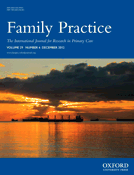
FAMILY PRACTICE
Advancing family medicine through rigorous research.FAMILY PRACTICE is a premier peer-reviewed journal dedicated to advancing the field of family medicine, published by Oxford University Press. Established in 1984 and continuing its influential discourse into 2024, the journal holds an esteemed position in the academic community, as evidenced by its classification in the Q1 quartile for Family Practice, ranking 10th out of 56 in this category according to Scopus. With an impressive impact factor and a commitment to disseminating high-quality research, FAMILY PRACTICE serves as an essential resource for researchers, clinicians, and students alike, striving to enhance practice and education in family medicine through evidence-based insights and innovative practices. While the journal maintains a traditional subscription model, it supports broad dissemination of knowledge that contributes significantly to the evolving landscape of healthcare in the United Kingdom and beyond.

AMERICAN JOURNAL OF MANAGED CARE
Connecting evidence-based practices to real-world solutions.AMERICAN JOURNAL OF MANAGED CARE is a premier peer-reviewed journal dedicated to the dissemination of research and insights in the fields of health policy and managed care. Published by Managed Care & Healthcare Communications LLC, this esteemed journal has been instrumental in shaping discussions on healthcare management and policy since its inception in 1996. With a 2023 classification in the first quartile (Q1) for both Health Policy and Medicine (miscellaneous), it stands as a significant resource for researchers, professionals, and students seeking to stay at the forefront of healthcare advancements. While this journal does not offer open access, it provides essential content that influences policy formulation and clinical practices across the United States and beyond. With a robust impact factor and a strategic focus on evidence-based methodologies, the AMERICAN JOURNAL OF MANAGED CARE remains committed to fostering a deeper understanding of managed care systems and improving healthcare delivery.
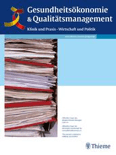
Gesundheitsoekonomie und Qualitaetsmanagement
Illuminating Trends in Health Policy and Economic StrategiesGesundheitsoekonomie und Qualitaetsmanagement, published by THIEME MEDICAL PUBL INC, serves as a vital resource in the field of health policy, particularly within the context of Germany. Since its inception in 1999, this journal has been committed to advancing the discourse on health economics and quality management, making significant contributions to understanding the complexities of healthcare systems. With an impact factor that reflects its ongoing importance, the journal is categorized in the Q4 quartile for Health Policy as of 2023, indicating its role in serving a niche yet crucial space in medical literature. Although currently not an open access journal, it remains accessible through various academic platforms, making its content available to a diverse audience of researchers, healthcare professionals, and students eager to engage with contemporary issues in health economics. With its publication continuing through 2024, Gesundheitsoekonomie und Qualitaetsmanagement is essential for anyone looking to deepen their understanding of the economic aspects of healthcare and ensure quality management in health services.
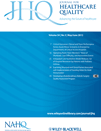
Journal for Healthcare Quality
Transforming health policy with critical insights.Journal for Healthcare Quality, published by Lippincott Williams & Wilkins, serves as a vital platform for disseminating innovative research and insights in the fields of health policy, public health, and medicine. With an ISSN of 1062-2551 and an E-ISSN of 1945-1474, this esteemed journal has been contributing to the improvement of healthcare practices since its inception in 1992. Positioned in the Q3 quartile across its relevant categories as of 2023, it addresses critical issues affecting healthcare quality and policy, demonstrating its commitment to advancing the field. Although it does not currently offer open access, the journal provides researchers and practitioners with an invaluable resource for enhancing their knowledge and practice through peer-reviewed articles aimed at an audience dedicated to improving health outcomes. Located in Philadelphia, the journal continually strives to bridge the gap between research and practical application, making it a cornerstone for those looking to impact healthcare quality.

Journal of Healthcare Quality Research
Fostering global conversations on healthcare quality.Journal of Healthcare Quality Research is an esteemed publication dedicated to advancing the field of health policy through rigorous research and comprehensive analysis. Published by ELSEVIER ESPANA SLU, this journal serves as a vital platform for researchers, professionals, and academics striving to address critical issues affecting healthcare quality across the globe. As a Q3 ranked journal in health policy for 2023, it holds a significant position within the Scopus rankings, showcasing its role in shaping healthcare discussions and policies. The E-ISSN: 2603-6479 reflects its commitment to wide accessibility, with an objective to provide insightful contributions that bridge gaps between theory and practice. With an impressive scope that spans from 2018 to 2024, the journal not only disseminates high-quality research but also fosters collaboration among policymakers and healthcare providers, driving innovations that enhance patient care and health systems worldwide.
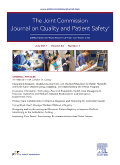
Joint Commission Journal on Quality and Patient Safety
Elevating standards through innovative research and practice.The Joint Commission Journal on Quality and Patient Safety is a leading publication in the field of health care quality and patient safety, under the esteemed auspices of Academic Press Inc Elsevier Science. With an impact factor reflecting its rigorous peer-review process and scholarly reputation, this journal aims to disseminate cutting-edge research, innovative practices, and effective strategies that enhance patient safety and healthcare delivery, making it an essential resource for researchers, professionals, and students alike. Operating without Open Access, the journal stands out with its impressive rankings in various Scopus categories, notably #4 in Nursing & Pediatrics and #10 in Nursing Leadership & Management, evidencing its significant impact in these fields. Since its inception in 2005, the journal has become a cornerstone for advancing knowledge and improving practices in healthcare settings, continuing to contribute to the dialogue on patient outcomes and quality improvement through 2024 and beyond. For practitioners and scholars dedicated to the advancement of healthcare standards, the Joint Commission Journal on Quality and Patient Safety remains a vital source of information and inspiration.

INTERNATIONAL JOURNAL OF RISK & SAFETY IN MEDICINE
Innovating approaches to medical safety.INTERNATIONAL JOURNAL OF RISK & SAFETY IN MEDICINE, published by IOS Press, serves as an essential platform for advancing the understanding of risk and safety within the medical domain. With an ISSN of 0924-6479 and E-ISSN of 1878-6847, this journal has been dedicated to fostering critical discourse since its inception in 1990, reflecting a continuous commitment to the field through 2024. Positioned within the Q4 category in Health Policy and Q3 in Medicine (miscellaneous) and Public Health, Environmental and Occupational Health, the journal provides valuable insights, empirical research, and theoretical analyses that speak to the diverse challenges faced in medical safety and risk management. Although it operates under a subscription model, the journal remains a vital resource for researchers, healthcare professionals, and students alike, facilitating the exchange of innovative ideas and best practices in health risk assessment. With Scopus ranks indicating its role as a key contributor in its categories, the INTERNATIONAL JOURNAL OF RISK & SAFETY IN MEDICINE continues to shape the landscape of medical safety and policy discussions around the globe.

Northern Clinics of Istanbul
Bridging gaps in knowledge with interdisciplinary research.Northern Clinics of Istanbul is an esteemed open-access journal dedicated to advancing knowledge within the field of medicine, specifically focusing on miscellaneous areas of general medicine. Published by KARE PUBL since 2014, it provides a vital platform for researchers, healthcare professionals, and students to share innovative findings and foster academic dialogue. With its ISSN 2148-4902 and E-ISSN 2536-4553, the journal has garnered attention in the academic community, earning a reputable Q4 quartile ranking in the category of Medicine (Miscellaneous) for the year 2023 and a Scopus rank of #497 out of 636. Based in Istanbul, Turkey, the journal is committed to accessibility and relevance, making significant contributions to the global medical discourse. Northern Clinics of Istanbul aims to serve as an interdisciplinary hub for innovative research, promoting the dissemination of knowledge and enhancing collaborative efforts among scholars. Join us in exploring the latest insights that are shaping healthcare today.